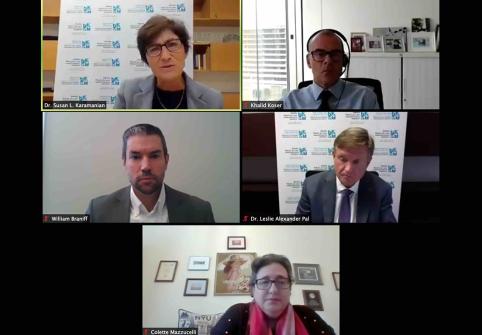الأخبار
Universities “Nervous” About Extremism Risk Among Students, Panel by QF’s HBKU
08 أكتوبر 2020International speakers explore education’s role in countering radicalization in Global Goals Week online event

University chiefs can be unnerved by the risk of their students becoming radicalized, according to the head of a global fund to prevent violent extremism, who has told a panel discussion hosted by Qatar Foundation’s Hamad Bin Khalifa University that young people may not see the issue as a priority for “global public good”.
Education to Eradicate: Extremism – What’s Next In A COVID-19 Reality? was the latest in a series of online sessions organized by Qatar Foundation and its members to align with Global Goals Week, bring together international speakers to discuss how local solutions can be found to worldwide challenges.
Amid fears that the social and economic disruption caused by the pandemic may see disillusionment turn to desperation among young people, and make them more susceptible to radicalization, the panel explored education’s role in keeping extremism at bay. Dr. Khalid Koser, Executive Director of the Global Community Engagement and Resilience Fund, was among those airing his views, and he warned that eradicating extremism is “very ambitious”.
“I think we can do that, but it’s going to be a challenge, and prevention is the first step,” he told the discussion, moderated by Dr. Susan L. Karamanian, Dean of Hamad Bin Khalifa University’s (HBKU) College of Law.
“Universities have a role in broadcasting knowledge and inspiring young people, but they can also be breeding grounds for violent extremism and radicalization. So working with universities and university leaders to make sure they have policies and procedures to guard against radicalization in their own halls is the first step we need to take.
“Public confidence is critical in countering extremism, and in most countries universities and academics are seen as objective and committed to science rather than having a political agenda. Universities also have a clear role in trying to help us understand this field – it’s still fairly unclear what drives people to extremism, and universities can add real value in this area.”
However, he added: “I’m more concerned that we still have university administrators who are very nervous about this deeply politically sensitive agenda around there being a risk of students in their university becoming radicalized, and restricting freedom of speech.
“Making young people global citizens is part of our purpose as teachers, professors, and university administrators, and lots of young people are global citizens when it comes to inequality and climate change, but I still don’t think countering violent extremism is seen by them as a global public good. Trying to get this more onto the agenda and raising the realization that preventing violent extremism is not just in the national security interest, but helps the world to be a better place, is important.”
William Braniff, Director of the National Consortium for the Study of Terrorism and Responses to Terrorism, told the discussion that crises like COVID-19 are ripe to be exploited by extremists, saying: “Humans really struggle with uncertainty, and when science fails to provide it, it’s easy for extremists to attack science and promote their own black and white ideologies that offer certainty in an uncertain world.
“It’s a tremendous challenge, and part of the solution lies in teaching young people to be critical consumers of information, encouraging them to be ambassadors for science, and teach them that it’s not enough to have the right information if you can’t communicate it properly and influence citizens’ behavior in positive ways.
“Private sector entities can also be hugely influential in shaping the beliefs of society. The question is whether we can get the private sector to understand it’s in their commercial best interests to play a vital role in countering violent extremism, and get scholars to figure out how they can work with organizations that have so much sway over people.”
According to Dr. Leslie Pal, Founding Dean of HBKU’s College of Public Policy, universities can make a vital contribution to a bank of knowledge about how to counter extremism that is still in its infancy.
“It may seem relatively obvious that we can try to address extremism through education, but in terms of global organizations, organized efforts, resource, and funding, it’s actually quite new,” he explained.
“That means we don’t know a great deal about what does and doesn’t work yet, and one of the contributions higher educations can make is to do the heavy lifting in evaluating and assessing what does work. Education institutions can command trust among the majority of populations, and we can collectively leverage that.”
The discussion also heard from Colette Mazzucelli, Senior Vice President at the Global Listening Centre and Professor at New York University, who said: “A university is responsible to society and responsible for guarding the notion of critical thinking and debate.
“Ensuring that continues is on us, as educators, and there is no more crucial time for that responsibility to be exercised that now, given what we are facing – a pandemic, violent extremism, personal data abuses, all of which feed into each other and create an ecosystem that is very fragile and vulnerable in terms of human security and the dignity of the person.”

